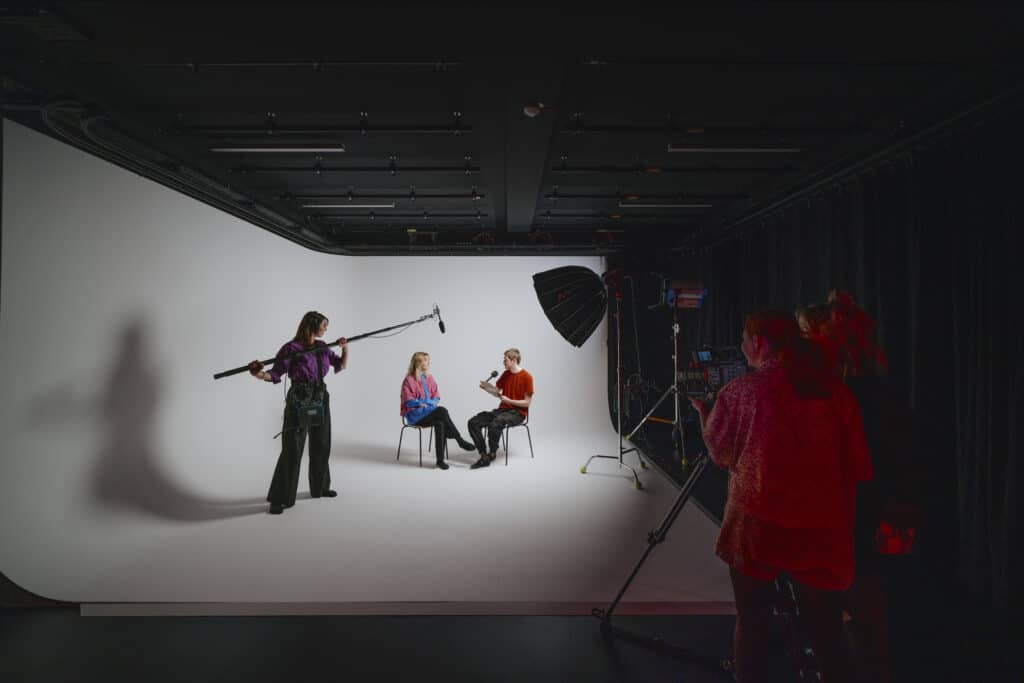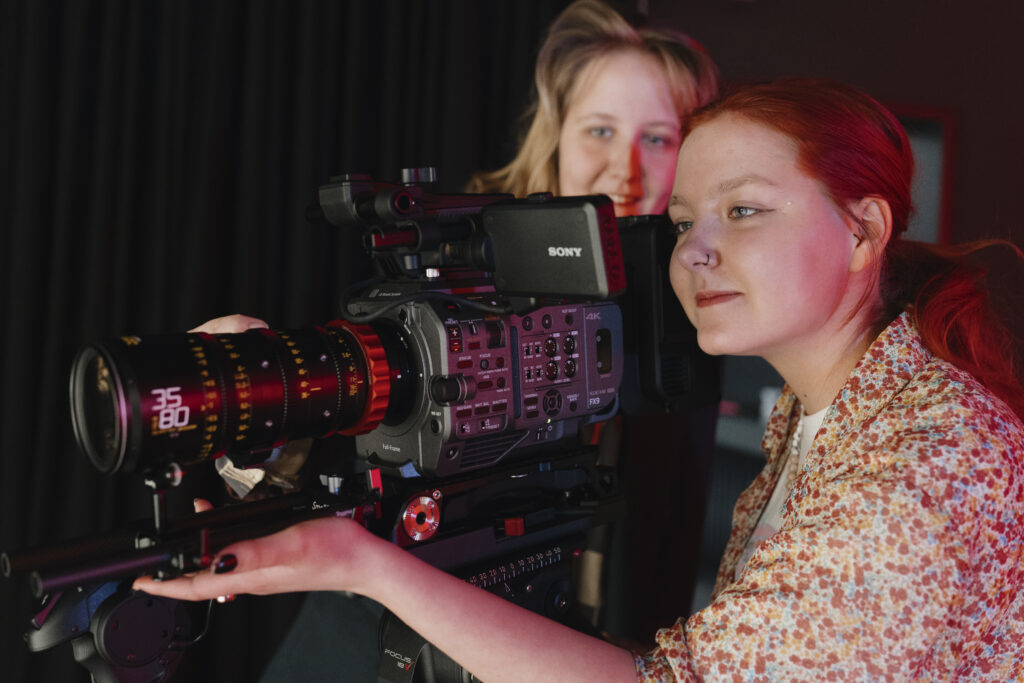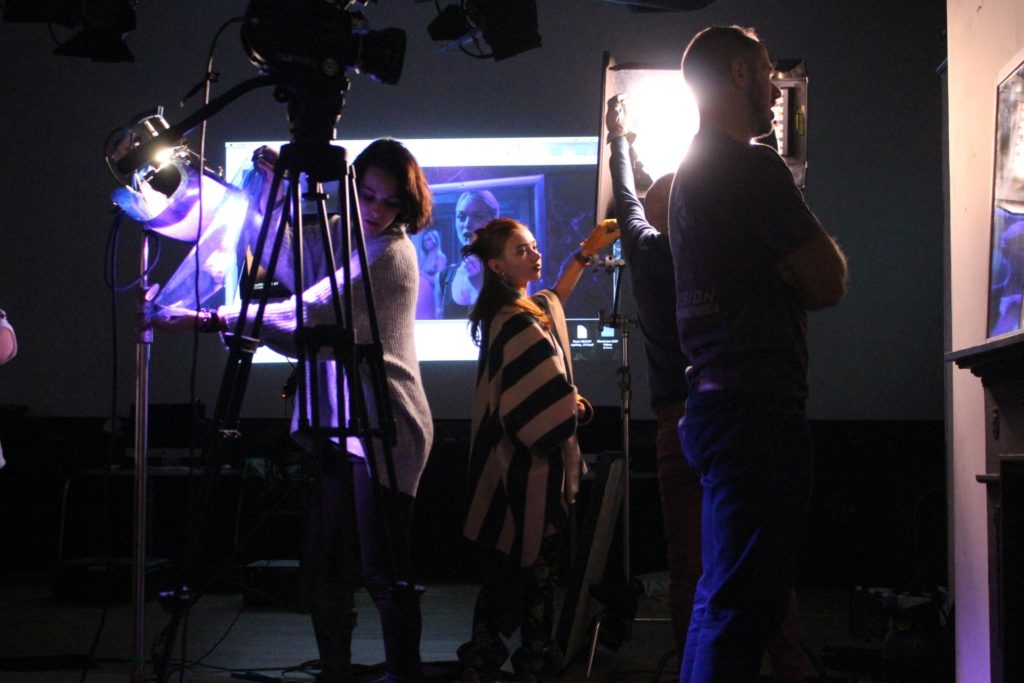BA (Hons) Filmmaking Top-Up
Have you already studied Filmmaking or a related subject at degree level, and achieved a minimum of 120 ECTS credits or higher from these studies? Then take your passion for Filmmaking further to achieve a full bachelor’s degree with our Filmmaking Top-Up course.
As a student on this cutting-edge one-year course, you’ll join together with third-year BA (Hons) Filmmaking students as together you get ready to enter the filmmaking industry as working professionals.
The Filmmaking Top-Up, like Year 3 of the BA (Hons) Filmmaking degree, puts your professional future in the spotlight. It encourages you to evaluate and assess your skills and industry engagement to date to help you plan your entry into the film sector. As part of this, you will create a portfolio that accurately communicates your expertise and specialism(s) within film production.
In tandem with the creation of your portfolio, you will also develop and produce a major film project, that allows you to focus on the area of filmmaking you’re most passionate about. The realisation of this project will see you collaborating with fellow students to work on at least one graduation film. Whether in a production or post-production role, it’ll provide evidence of your capabilities to make your portfolio stand out in this competitive industry.
The Filmmaking Top-Up course also allows you to choose a specialist module that complements the skills on display in your final project. With options such as directing, screenwriting, lighting, production logistics, and sound recording, you’ll be given dedicated time to practice, experiment and explore in your specialism before putting what you learn into practice during production and post-production.
Based in Berlin, you’ll also be able to take advantage of the city’s thriving film and creative industries. Through freelance work opportunities, film festivals and working together with students from across the BIMM creative community, you’ll build an international network that you can rely on as you start your filmmaking career.




Film forms you can specialise in:
- Narrative Shorts
- Documentary
- Other Short Formats e.g. music video
Disciplines you can specialise in:
- Screenwriting
- Directing
- Cinematography: All camera department roles
- Producing
- First Assistant Directing (Production Logistics)
- Production Sound Mixing
- Editing
- Lighting/Gaffer
Course Specification
Mode of attendance: Full-time
Length of course: 3 years (final year only via Top-Up)
Awarding institution: BIMM University (UK)
Campus delivery: Berlin
Language of study: English
Credits: 60 ECTS/ 120 FHEQ (UK)
Entrance interview
All applicants must successfully complete an entrance interview with BIMM University Berlin (details provided on application).
Minimum of 120 ECTS credits acquired in a similar subject: UK Level 5 qualifications including Higher National Diploma, FdA, FdSC etc. also recognised.
Academic entry criteria equivalent to a minimum of 64 UCAS points, equivalent to:
- General Higher Education entrance certificate (Award of Zeugnis der Allgemeinen Hochschulreife/ Abitur, or a Fachgebundene Hochschulreife/ Fachhochschulreife) with an overall average grade of 3.0, including a minimum grade of 10 on the English component (Leistungsfach) on the Abiturprüfung.
- 2 A-levels at Grade C or above, or BTEC Level 3 equivalent, and normally three GCSEs at a minimum grade C/4, including English Language.
- Please reference the Entry Requirements webpage for additional international qualification equivalencies.
Proof of English Language proficiency is required if English is not your first language.
Minimum Requirements
All applicants must successfully complete an entrance interview with BIMM University Berlin (details provided on application).
Academic entry criteria meeting a minimum of 64 UCAS points, equivalent to:
- General Higher Education entrance certificate (Award of Zeugnis der Allgemeinen Hochschulreife/ Abitur, or a Fachgebundene Hochschulreife/ Fachhochschulreife) with an overall average grade of 3.0, including a minimum grade of 10 on the English component (Leistungsfach) on the Abiturprüfung.
- 2 A-levels at Grade C or above, or BTEC Level 3 equivalent, three GCSEs at a minimum grade C/4, including English Language.
- Please reference the Entry Requirements webpage for additional international qualification equivalencies. For applicants with significant prior professional experience and aged 19 years or older, offers may be made under the BIMM University Recognition of Prior Practice Policy.
- Proof of English Language proficiency is required if English is not your first language. BIMM University Berlin requires an equivalent to Level B2 CEFR (Common European Framework of Reference for Languages).
- Proof of English Language proficiency is required if English is not your first language. BIMM University Berlin requires an equivalent to Level B2 CEFR (Common European Framework of Reference for Languages).
- Minimum of 120 ECTS credits acquired in a similar subject: UK Level 5 qualifications including Higher National Diploma, FdA, FdSC, etc. also recognised.
Progression
Graduates can progress directly to a career in the film, television and screen industry in areas such as producing, directing, screenwriting, sound, post-production, cinematography and first assistant directing.
Course Fees
As part of Europe’s most successful group of music, film and performing arts colleges at BIMM University Berlin, the Screen and Film Faculty is uniquely positioned to offer outstanding value and quality.
We’re dedicated to giving our students the best film education possible – which means accessing our globally successful first-rate lecturers in premium locations at the heart of Germany’s film scene.
Such cutting-edge facilities can be expensive, but we make sure all BIMM University Berlin courses are great value for money – representing a practical and affordable investment for your future career in the film industry.
Year 3 (Top-Up)
Module names and structure may be subject to change.
This module is the final step in your Film School journey and will support you as you look to enter your chosen field as a creative professional. Drawing on evidence from throughout your time at Screen and Film School you will critically self-evaluate your personal learning journey and industry engagements to date. You will explore concepts and theories of personal and professional development to support, challenge and test your assumptions, to determine your readiness for work in the creative industries. You will have the opportunity to discuss this with your peers and learn from your collective experiences in both small degree path groups and large mixed discipline sessions. With this position in mind, you will then be challenged to create and consolidate creative assets to give you the edge over the competition in your chosen field. Specialist workshops will be offered throughout the module, informed and delivered by our wide – reaching connections and specialist tutors in the creative industries. This culminates in the creation of a portfolio which tells the story of your personal and professional journey so far, communicating your unique professional identity and future career plans in the creative industries.
In this module you will undertake a significant project of your own choosing. It’s your chance to explore your passion within the industry and creative arts: experiment, take risks, strengthen your skills and create a product/cohesive portfolio of work that you are proud to showcase at the end of your degree. This module will support you in consolidating the broad learning and development from the course so far, building a bridge into industry, the workplace and future opportunities. You will be supported to self-direct your own learning through a series of lectures, seminars and 1:1 tutorials with expert supervisors. Primary and action research are supported in this module both through theory and feedback guidance. The series of lectures will provide a strong theoretical understanding of key research methodologies and approaches, and the application of this learning supported through feedback in seminars and tutorials.
Through this module you will gain an in depth understanding of your production or post-production specialism and then implement it within a professional context within the production of your graduation films This module focuses on your engagement with your principal production role in preparation for working collaboratively on a digital film/film production in the Production Realisation module in Semester 2. The possible roles that you will specialise could be Producer, Writer, Director (Fiction or Factual) Cinematographer, Camera Operator, Grip, Production Designer, Assistant Director, Sound Recordist & Designer and VFX Effects Designer and Editor. You will develop and refine your collaborative and teamworking skills through this module, in order for you to able to realise your specialist role within a production team. Through the pre-production process you will explore all aspects of development and pre-production relevant to your chosen role and work in your production teams to prepare your films in readiness for production in production realisation.
Within this module you will be supported with the development of a major film project through production, post-production and with the final realisation and delivery of the creative outcome. This module builds on and advances your development and pre-production skills that you have been working on during the Pre-production Process module and supports you to realise this research and idea development process within the production of a graduation film within this module. This module represents the culmination of all the technical, logistical and creative development that you have undertaken within your time on the course and supports you in utilising it within a production role of one or more of the graduation films. The module will also refine your collaborative working skills, enabling you utilise them within a high end, professional production.
This module advances your understanding and development of narrative structure and the art of screenwriting to an expert level in order to prepare for working on both your script that is in production as a graduation film and also with your development of your feature film script in Pre-Production and Production Realisation. It will also refine your critical understanding of the crafts of short-form storytelling and also how to structure and write a feature length script. You will develop further the key elements of screenwriting; theme, plot, story and characters and work towards developing your ideas into a completed script and refine be able to develop them into a completed short and feature length script. This module will also support you to develop your professional processes that are inherent within the screenwriting process and support you in developing your creative idea development and finding the appropriate tools in order to develop the idea successfully into a completed screenplay. There will be a number of advanced workshops including sessions in improvising and developing your screenplay with actors, masterclasses with industry professionals and also sessions on the realities of working as a freelance scriptwriter.
This module advances your directing skills and develops your understanding of the practices and crafts of short-form narrative development and directing to prepare you to work successfully as a director on a graduation film. It will enable you to further develop your narrative and directing skills for fiction based filmmaking as well as exploring in more depth how directors research and develop their ‘vision’ for a film focusing on idea and story development, creative visualisation and also being able to successfully work with actors. This module will develop the skills that are needed in order to take on this role and support your development as a director through a series of advanced workshops, seminars and masterclasses. A key part of the module delivery will be working and directing actor workshops where you will refine your experience of working productively with actors, preparing you for the pre-production and production modules of level 6. Throughout the module you will also refine your communication skills (both visual and verbal) and ensure that you are able to work successfully within a team in order to realise a short narrative film.
This module develops and advances your skills in research, development and realisation of factual programme making and documentary production in order to prepare you for working at an expert level within the pre-production and production modules on level 6. The module will support your advanced development and your ability to direct the different forms and approaches to documentary production. You will also be encouraged to experiment and develop new and innovative new kinds of factual and documentary outcomes, as well become accomplished in the traditions of the genre. This will include how to develop your documentary directing skills in directing observational sequences, interviews and visualisation of your ideas. It will also enable you to finesse and develop your directing skills to create accomplished documentary and factual outcomes and will explore in further depth how directors research and develop their idea for a film focusing on idea development, creative visualisation and also being able to successfully work with contributors.
Building on the experience of creative producing and managing the production 1 & 2 in level 5, this module advances your skills to an expert level within the role of the Producer as well as the other key roles in the production department. Through this specialist module you will develop the professional protocols that make up the role of producer. Through a series of advanced workshops, seminars and production meetings this module will support you to develop the key areas that will enable for you to become an expert producer and/or production manager overseeing a production from initial idea and script through to supporting its distribution via film festivals and other forms of screenings. Other key areas that you will refine throughout the module will be financial acquisition, crewing, casting, negotiation of locations, budgeting, scheduling, insurance and intellectual property. The workshops within the module will ensure that you are creatively, technically and logistically ready to be able work at an advanced level on your graduation films that are part of your pre-production and production realisation modules.
This module will build on knowledge gained in the Level 5Production Design and Art Direction Modules and give you an advanced insight into the art department. With a focus on the role of the designer or art director, this module will continue to enrich your storytelling ability, broaden your visual language and help you become a better communicator. The learning and employment of specialist skills will expand your industry knowledge and provide you with a set of tools to enhance your filmmaking practice. Through research and speculative design work you will learn, employ and present your design skills, expanding industry knowledge and enhancing your filmmaking practice. The module comprises of two projects; a short research project and a longer independent design or art direction project. Through these two projects you will gain both specialist industry knowledge, this will raise your level of professionalism, ability to communicate and present your work to a high standard. It will also enable you to work more efficiently on your live short film projects and build a portfolio of work to help you in your career aims.
This module further develops and advances your understanding and technical fluency in the key creative discipline of cinematography to prepare you for the productions in level 6 Pre-Production and Production Realisation modules. It will develop your understanding of the role of the DOP and develop the skills needed in industry to work successfully in the role. You will develop the research needed in order to successfully create the films aesthetic through lighting, framing and camera movement and will have developed a good understanding of the camera and lighting kit and crew needed to achieve this. The module will also support and develop your understanding of both the theoretical grounding and practical experience of working as Head of Department in this central creative production role, with a focus on developing visual language and storytelling. Throughout the module you will also develop your understanding of the professional protocols of current industry practice to an expert level appropriate for level 6.
This module will advance your understanding and technical proficiency in the related disciplines of sound recording and sound design to an expert level to prepare you for working on the graduation films in the Pre-Production & Production realisation modules. You will refine and develop your understanding during this module of the two distinctive different roles sound play within film production. You will also continue to develop an in-depth understanding of the processes and protocols of recording sound on set and also your understanding of how to work with the editor and director to create a soundscape or working in sound design in post-production. During this module you will develop further your comprehension of sound theory and practice which will inform your production and post-production roles in the sound department and also learn about recording sound on set, the development of soundscapes and sound design and the realisation of sound in the final mix.
This module will advance your understanding of the role of the editor to an expert level to prepare you for the graduation films that will be produced in the Pre-Production and Production realisation modules in level 6.This module develops and advances your understanding of editing theory and film grammar, alongside developing your technical proficiency in the key stages of an editing and post-production schedule. During this module you will also develop your understanding of the different elements of the post-production workflow to an expert level in preparation for the working on the graduation films. You will be able to utilise professionally data organisation and management, and also have developed your technical proficiency of the grading process. You will also have a developed comprehension of the different styles and processes of editing within different genres including fiction, documentary, music video and short form branded content.
This module will support you to advance and develop your technical skills that are required to develop as a professional VFX and compositor professional in industry. It will also prepare you for the work you will undertake on the graduation films in the Pre-Production and Production Realisation modules in level 6. The module will ensure you have embedded and established the key compositing skills that you need in order to work in the industry and will support you to develop and refine your skills to develop your skills in key industry techniques such as rotoscoping, transitions, lens flares and opticals, continuity fixes & combining multiple takes, grading and sky replacements.
This module develops your understanding of the role of the developing, commissioning and distribution industry processes in production in order to be utilised in the Pre-Production and Production Realisation in level 6. This module also embeds through advanced workshops and seminars these key processes in film business and the related roles and responsibilities that come together to bring films from idea to the screen. The landscape of development, commissioning and distribution is often complex and diverse and this module will support you to develop your understanding of how to navigate it in order to develop ideas, secure intellectual property rights and co-production deals and ensure that it is funded. It will also further develop your understanding of distribution costs and pre-sales, global territories, copywrite and deliverables in order to support your graduation films in level 6.
This module is designed to advance and refine your camera, grip and lighting techniques to an expert level and ensure that you are creatively, technically and logistically ready to be able work at an advanced level on your graduation films that are part of your pre-production and production realisation modules. This module advances your technical knowledge and skills to intermediate level in the camera, grip and lighting departments. The relationship between the camera, grip and lighting department is key to how the shot will look, through a series of advanced practical workshops, seminars and lectures you will develop your technical knowledge of the roles of camera operator, camera assistants and focus puller using a variety of both digital and analogue film cameras to an expert level. You will also gain knowledge of camera systems and grip equipment, in both in the film studio set-up and on location. During the module you will also develop your technical knowledge of the roles of the gaffer, best boy and sparks. This module will also include an advanced understanding of green screen, studio lighting, electrics, cable management and health and safety in the both the film studio and on location.
The Assistant Director and their team are the glue that holds together a shoot, their main aim being to ensure the successful creative realisation of the script within the parameters of the production and working closely with the Director, Producer, DOP, make-up, wardrobe, actors and supporting artists. The ADs are responsible for scheduling the shoot, running the floor, ensuring that scheduled scenes are completed and ultimately making sure each day runs as smoothly as possible to support the creative vision. In this module, you will further develop an understanding of scheduling strategies, running the floor, crew dynamics and leadership skills as well as apply these skills to a more ambitious and demanding production. You will explore the role in more depth and to an expert level developing your role to one where you are confident to work independently in complex situations and develop high level of skills in leadership, managing conflict and risk, understanding psychology of the workplace orchestrating complex action. This module will comprise of two assessments: a portfolio of production planning documents a short film project and a presentation of key skills learnt and applied in the specialism. Through these modules you will both gain specialist industry knowledge and raise your level of professionalism, ability to communicate and present your work to a high standard. It will also enable you build a portfolio of work to help you in your career aims. This module will support you to advance your understanding of your production logistic skills to an expert level to prepare you for working on the graduation film on the Production Realisation module in Semester 2.
This module will support you to advance your understanding of your Research for Specialism skills to an expert level to prepare you for working on the graduation film on the Production Realisation module in Semester 2. The advanced research and communication abilities developed through this module should enable you to undertake post-graduate academic study and enhance your employability in the filmmaking industry. During the first half of the module, three research methodology and academic skills seminars will allow you to investigate the relationship between theory and practice in your chosen specialism by critically engaging with major thinkers and debates which contextualise and influence contemporary filmmaking. One-to-one tutorials will help you to identify an appropriate research question for your study and to develop the capacity for analysis and synthesis necessary for the dissemination of your findings. A significant amount of learning will take place by means of independent study, as appropriate for BA (Hons) Level 6 students.
This module will develop and advance your understanding of the production processes and structures of the factual entertainment form to prepare you for working on the graduation films in the Pre- Production and Production Realisation in level 6. It will enable you to understand and confidently navigate the different roles which will enable you to understand this varied and broad form of factual television. The areas that the module will develop further are the role of the idea development producer and how to prepare you to realise, develop and pitch factual entertainment ideas. Seminars will also be given on how to source the appropriate commissioning editors and also understanding who is the audience for your idea. This will include how to navigate the industry and identify the different broadcasting, streaming services and commissioning structures that make up this landscape. The module will also explore embed further how to develop Ideas in factual formats and how to realise your ideas and creativity through brainstorming within an idea development team.
AKIZ, born 1969 studied painting and photography at the Art School in Stuttgart as well as…
For the past 20 years, Alex has been working in creative media production and education, lecturing…
Andreas Hildebrandt is an experienced sound designer, sound mixer, and re-recording mixer with over two decades…
Born 1979 at the Baltic Sea of Germany. After three years as a flight attendant, Anne…
Born in Germany to Italian immigrants, he studied cinematography at the renowned Filmakademie Baden-Württemberg. He began…
A prominent member of the Berlin Film School, Christoph has made a significant impact on contemporary…
Designer and Art Director based in Berlin, holding a Bachelor’s in Architecture, a Master’s in Multimedia…
Florian Aigner studied German literature and worked as a film producer before studying film direction at…
Filmmaker, video artist and cutter with more than 20 years of experience in the fields of…
Any questions?
For any questions regarding our courses or if you’d like more information on how to apply to BIMM University Berlin, please contact our Admissions Team on +49 (0)30 311 99 186 or email admissions@bimm-university.de.











